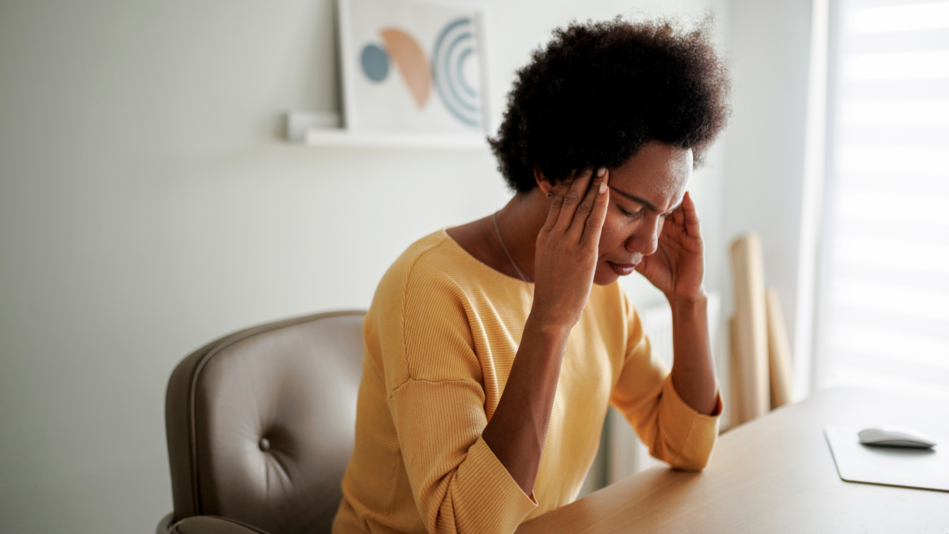6 Ways to Take Action During Times of Uncertainty
People react differently to uncertainty, but you can take some simple steps to build your resilience in uncertain times.

Photo: Eleganza/Getty Images
Americans have experienced an intense range of stressors over the past few years, as the COVID-19 pandemic, racial injustice and political divisiveness have dominated news cycles and social media. Stress in America 2022: Concerned for the Future, Beset by Inflation, a new survey conducted by The Harris Poll on behalf of APA, tells a story of uncertainty and dissolution.
Facing a barrage of external stressors that are mostly out of personal control, the survey found a majority of adults are disheartened by government and political divisiveness, daunted by historic inflation levels and dismayed by widespread violence.
APA is committed to empowering people to find ways to take back control and to find peace and calm in the chaos. Here, our psychologists offer advice and strategies to help the nation navigate the fear of the unknown and pervasive threats to the well-being.
Disrupt negative thinking. Get out of the habit of ruminating on potential consequences. It can make you feel like the worst case is already happening. When we pregrieve about possibilities, we feel threatened and afraid before it is necessary. Take a breath when you find yourself spiraling into negative thoughts or tragic worst-case scenarios. Instead, try to imagine the best possible scenarios, and figure out a role for you in making those happen.
Do something unexpected. You can train yourself to be more comfortable with uncertainty. Stretching ourselves to try something new or go somewhere unfamiliar or go without a schedule can help us become more comfortable with the unknown and our ability to handle it.
Take control where you can. Research shows taking action over aspects of life that are within one's personal control can feel empowering and help mitigate stress over things that are out of one's control. For example, voting, volunteering, and community involvement can help people feel more connected and in control over their own futures. In fact, research has found people who volunteer may live longer than those who don't.
Don't judge yourself against others. Some people are better at dealing with uncertainties than others, so don't beat yourself up if your tolerance for unpredictability is lower than a friend's. Remind yourself that it might take time for the stressful situation to resolve and be patient with yourself in the meantime.
Take your own advice. Ask yourself: If a friend came to me with this worry, what would I tell them? Imagining your situation from the outside can often provide perspective and fresh ideas.
Don't look for a rescuer. Asking someone else to solve the problem for you perpetuates the feeling that you are powerless. Rescuers are often actually enablers who keep us from taking responsibility for our own lives. Instead, seek out emotionally supportive friends and family who see you as capable and can help you focus on next steps for addressing your concerns.
Visit APA.org for more resources and information designed to help you OWN your mental health.
Facing a barrage of external stressors that are mostly out of personal control, the survey found a majority of adults are disheartened by government and political divisiveness, daunted by historic inflation levels and dismayed by widespread violence.
APA is committed to empowering people to find ways to take back control and to find peace and calm in the chaos. Here, our psychologists offer advice and strategies to help the nation navigate the fear of the unknown and pervasive threats to the well-being.
Disrupt negative thinking. Get out of the habit of ruminating on potential consequences. It can make you feel like the worst case is already happening. When we pregrieve about possibilities, we feel threatened and afraid before it is necessary. Take a breath when you find yourself spiraling into negative thoughts or tragic worst-case scenarios. Instead, try to imagine the best possible scenarios, and figure out a role for you in making those happen.
Do something unexpected. You can train yourself to be more comfortable with uncertainty. Stretching ourselves to try something new or go somewhere unfamiliar or go without a schedule can help us become more comfortable with the unknown and our ability to handle it.
Take control where you can. Research shows taking action over aspects of life that are within one's personal control can feel empowering and help mitigate stress over things that are out of one's control. For example, voting, volunteering, and community involvement can help people feel more connected and in control over their own futures. In fact, research has found people who volunteer may live longer than those who don't.
Don't judge yourself against others. Some people are better at dealing with uncertainties than others, so don't beat yourself up if your tolerance for unpredictability is lower than a friend's. Remind yourself that it might take time for the stressful situation to resolve and be patient with yourself in the meantime.
Take your own advice. Ask yourself: If a friend came to me with this worry, what would I tell them? Imagining your situation from the outside can often provide perspective and fresh ideas.
Don't look for a rescuer. Asking someone else to solve the problem for you perpetuates the feeling that you are powerless. Rescuers are often actually enablers who keep us from taking responsibility for our own lives. Instead, seek out emotionally supportive friends and family who see you as capable and can help you focus on next steps for addressing your concerns.
Visit APA.org for more resources and information designed to help you OWN your mental health.

